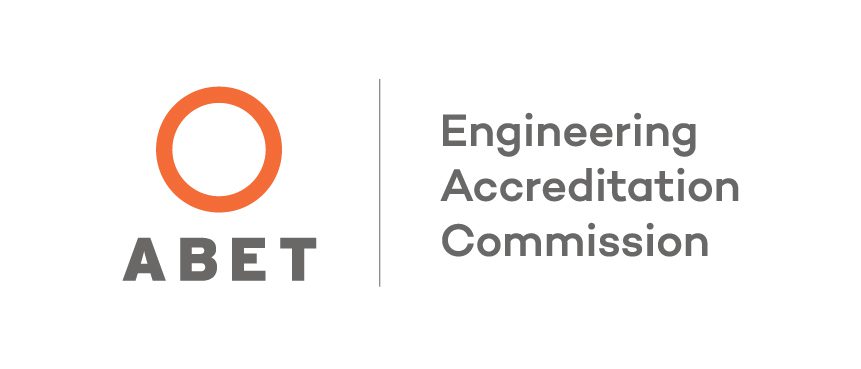Mechanical Engineering (Bachelor of Science) ABET Accreditation
ABET Status

ABET is the recognized accreditor for college and university programs in applied science, computing, engineering, and technology. ABET has provided leadership and quality assurance in higher education for over 70 years.
The Mechanical Engineering (Bachelor of Science) program at Tarleton State University is accredited by the Engineering Accreditation Commission of ABET, https://www.abet.org, under the General Criteria and the Program Criteria for Mechanical and Similarly Named Engineering Programs.
Mechanical Engineering (Bachelor of Science) Mission
The mission of the Mechanical Engineering (Bachelor of Science) program is to prepare graduates for employment as an engineer in a breadth of Mechanical Engineering related industries, for engineering licensure, and for graduate studies in Mechanical Engineering or related discipline. This is accomplished through a curriculum supported by hands-on laboratory and prototyping experiences in which students develop their ability to synthesize concepts into solutions, use modern analytical tools and techniques, communicate professionally and work in a team environment. Additional studies in ethics develop students’ ability to understand the responsibilities to society.
The mission of the Mechanical Engineering (Bachelor of Science) program aligns with the mission of the Mayfield College of Engineering, as well as the mission of Tarleton State University with the common thread of academic rigor, real-world experiences, engaged faculty and the development of ethical scholars and leaders.
Mechanical Engineering (Bachelor of Science) Program Educational Objectives
Program Educational Objectives (PEOs) are broad statements that describe the career and professional accomplishments for which the program is preparing its graduates, i.e. what we expect the graduates to be doing in the first few years after graduation.
The Program Educational Objectives (PEOs) for the Mechanical Engineering (Bachelor of Science) program were developed based upon the needs of our constituents to meet the desired expectations in both industry and graduate school. These PEOs are aligned with the mission of the university, the college, and the program. The Mechanical Engineering (Bachelor of Science) PEOs are as follows:
- Graduates are successful in mechanical engineering-related careers and/or pursuing advanced degrees in which they utilize their innovative problem-solving and design skillsets.
- Graduates are team players who communicate effectively, interact professionally, manage conflict with high interpersonal skills, and practice ethical and economic decision-making by considering the safety, welfare, and health of the public in their post-graduation endeavors.
- Graduates are lifelong learners who maintain curiosity, value a wide range of perspectives, and keep up with trends and technologies in their field, while actively advancing their careers and their profession through activities such as taking on leadership roles, engaging with professional societies, and attaining professional licensure.
Strategies to prepare graduates to achieve the PEOs include modeling of these behaviors by faculty, facilitating preparation and requiring students to take the FE exam, and providing opportunities for interactions with industry professionals and graduate program representatives. Evidence to support achievement includes FE and PE performance and maintaining contact with program alumni through social media (e.g. LinkedIn, Facebook, Twitter, etc.) and Tarleton’s alumni association.
Mechanical Engineering (Bachelor of Science) Student Outcomes
The Student Outcomes support the program educational objectives and achievement of these outcomes prepares graduates to enter the professional practice of engineering.
The Student Outcomes for the Mechanical Engineering (Bachelor of Science) program are defined as the ABET Criterion 3.1-7 Outcomes. Graduates of the Mechanical Engineering (Bachelor of Science) program will have demonstrated the ability to:
- 3.1: identify, formulate, and solve complex engineering problems by applying principles of engineering, science, and mathematics.
- 3.2: apply engineering design to produce solutions that meet specified needs with consideration of public health, safety, and welfare, as well as global, cultural, social, environmental, and economic factors.
- 3.3: communicate effectively with a range of audiences.
- 3.4: recognize ethical and professional responsibilities in engineering situations and make informed judgments, which must consider the impact of engineering solutions in global, economic, environmental, and societal contexts.
- 3.5: function effectively on a team whose members together provide leadership, create a collaborative and welcoming environment, establish goals, plan tasks, and meet objectives.
- 3.6: develop and conduct appropriate experimentation, analyze and interpret data, and use engineering judgment to draw conclusions.
- 3.7: acquire and apply new knowledge as needed, using appropriate learning strategies.
The Student Outcomes and Program Educational Objectives capture the marketable skills we have identified for our engineering program students and alumni, which are
- Problem solving, design and technical skills
- Communication and interpersonal skills
- Ethical decision making
- Teaming skills
- Enthusiasm, perseverance and commitment
Annual Student Enrollment
| MeChanical Engineering Count by major data | Count |
|---|---|
| Fall 2020 | 177 |
| Fall 2021 | 177 |
| Fall 2022 | 205 |
| Fall 2023 | 237 |
Graduation Data
| Mechanical Engineering graduation data | count |
|---|---|
| 2020-2021 | 14 |
| 2021-2022 | 15 |
| 2022-2023 | 30 |